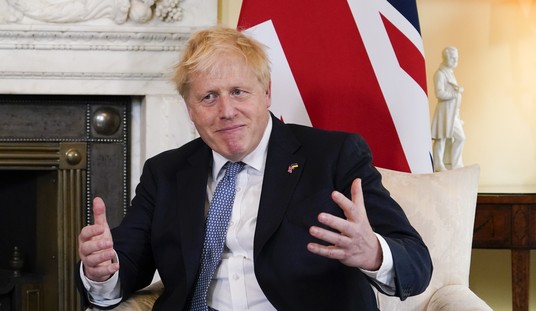When the Tea Party first rose to prominence in 2009 as an antidote to the Obama administration’s corporatism, cronyism, and massive spending and regulatory overreach, the MSM suffered a slow-motion collective aneurism, convinced that the fascist revolt was finally at hand.
Yes of course, as Jonah Goldberg tried to warn them in Liberal Fascism, they were looking in the wrong direction, but there’s nearly a century of precedent for the elitist left to believe that main street America is the source of all evil in America.
This often reaches to absurd extremes; even before Obama took office, Garrison Keillor, the midwestern humorist and staple of NPR, saw his tone grow brittle and harsh when he surveyed the right:
The party of Lincoln and Liberty was transmogrified into the party of hairy-backed swamp developers and corporate shills, faith-based economists, fundamentalist bullies with Bibles, Christians of convenience, freelance racists, misanthropic frat boys, shrieking midgets of AM radio, tax cheats, nihilists in golf pants, brownshirts in pinstripes, sweatshop tycoons, hacks, fakirs, aggressive dorks, Lamborghini libertarians, people who believe Neil Armstrong’s moonwalk was filmed in Roswell, New Mexico, little honkers out to diminish the rest of us, Newt’s evil spawn and their Etch-A-Sketch president, a dull and rigid man suspicious of the free flow of information and of secular institutions, whose philosophy is a jumble of badly sutured body parts trying to walk.
Geez, why does Garrison Keillor hate Whoopi Goldberg so?
More seriously, if Keillor’s rhetoric sounds sclerotic and reactionary, it’s because he’s tapping into a nearly century-old tradition of “Progressives” who see no evil on the left; but plenty bubbling up from the right. In his new book, The Revolt Against the Masses, Fred Siegel looks back at Sinclair Lewis’s 1935 book, It Can’t Happen Here, which posited that the Rotary Club(!) was poised to seize American power:
The heart of It Can’t Happen Here is laid out in the opening chapter, which presents the local Rotary Club, with its Veterans of Foreign Wars tub-thumping patriotism and prohibitionist moralism, as comparable, on a small scale, to the mass movements that brought Fascism to Europe. Later in the novel, he has a character explain, half-satirically and half-seriously, “This is Revolution in terms of Rotary.” In other words, Lewis’s imagined fascism is little more than Main Street writ political. When he wants to mock Windrip, he describes him as a “professional common man” who is “chummy with all waitresses at . . . lunch rooms.” For Lewis, fascism is the product of backslapping Rotarians, Elks, and Masons, as well as various and sundry other versions of joiners that Tocqueville had once celebrated as the basis of American self-government. There is more than a hint of snobbery in all this. The book’s local incarnation of evil is Jessup’s shiftless, resentful handyman Shad Ledue, who was a member of the “Odd Fellows and the Ancient and Independent Order of Rams.” Ledue uses Windrip’s ascension to rise above himself and displace Jessup from his rightful place in the local hierarchy of power.
If the book were merely an indictment of red-state nativist intolerance, there would be little to distinguish it from numerous other novels and plays of the 1920s that were part of “the revolt against the village.” Lewis was hardly the only writer of the period to, Mencken-like, describe the average American as a “boob” or “peasant.” What made It Can’t Happen Here compelling was that it showed the boobs working through a familiar institution, the local Rotary, to become a menace to the Republic.
In a 2012 issue of Commentary, building on research for The Revolt Against the Masses, Siegel goes on to note that after World War II, the Frankfurt School picked up the left’s attack against middle America:
“In the over-developed countries,” wrote Herbert Marcuse, who became the most famous Frankfurt School theoretician of the 1960s, “an ever-larger part of the population becomes one huge captive audience—captured not by a total regime, but by the liberties of the citizens whose media of amusement and elevation compels the Other to partake of their sounds, sights, and smells.” He was arguing, in effect, for greater social segregation between the elite and the hoi polloi.
Dwight Macdonald, the most influential American critic of mass culture in the late 1950s, concurred with the Frankfurt School. Writing in crackling prose redolent of Mencken’s, he too argued that bourgeois prosperity was creating a cultural wasteland: “The work week has shrunk, real wages have risen, and never in history have so many people attained such a high standard of living as in this country since 1945,” Macdonald complained.
“Money, leisure, and knowledge,” he went on, “the prerequisites for culture, are more plentiful and more evenly distributed than ever before.”
Macdonald, who was educated at Phillips Exeter Academy and Yale and associated with the anti-Stalinist leftists at Partisan Review, still couldn’t bring himself to support the United States against the Nazis in World War II on the grounds that “Europe has its Hitlers, but we have our Rotarians.”
My dad, who passed away in 2006, was a life-long member of the Rotarian Club, and president of his local South Jersey chapter for a year in the mid-1970s. At the time, I just remember him putting on a gray suit, navy blue rep tie and his omnipresent double-soled black Florsheim wingtips to trundle off to the weekly meetings.
In retrospect, I had no idea how Absolutely. Hard. Core. he was.
Similarly, “When the Roosevelt administration got into rough waters over its court-packing schemes, Secretary of the Interior Ickes invoked It Can’t Happen Here to brand FDR’s critics as fascists,” Siegel writes. As late as 1948, Harry Truman smeared Thomas Dewey as a Nazi. Four years earlier, in his final State of the Union speech, FDR thundered:
One of the great American industrialists of our day—a man who has rendered yeoman service to his country in this crisis-recently emphasized the grave dangers of “rightist reaction” in this Nation. All clear-thinking businessmen share his concern. Indeed, if such reaction should develop—if history were to repeat itself and we were to return to the so-called “normalcy” of the 1920′s—then it is certain that even though we shall have conquered our enemies on the battlefields abroad, we shall have yielded to the spirit of Fascism here at home.
As Jonah Goldberg noted in 2010:
Keep in mind that the 1920s was a decade of roaring economic growth. The return to “normalcy” FDR referred to was the return to a more limited form of government (not counting Prohibition). The Republicans released Woodrow Wilson’s political prisoners. They shuttered the Democrats’ propaganda ministry (the Committee for Public Information). They called off the censorship and the “war socialism” of the Wilson years. And they helped usher in roaring economic growth.
Pres. Calvin “Silent Cal” Coolidge, the poster boy for the ’20s, was once asked what he thought of his achievements in office. He replied: “Perhaps one of the most important accomplishments of my administration has been minding my own business.”
That was the return to normalcy FDR was talking about. A government minding its own business, according to FDR, amounted to the spirit of fascism.
Hey, America must remain on constant vigil: Those Rotarians could rise up and seize the levers of power any day now.
Any day now. Really, it could happen here!
All kidding aside, as we noted at the start of the post, the “Progressives'” attack on small business and suburbia has had repercussions that ripple to the present day. As Christopher Caldwell wrote over a decade ago in the Weekly Standard, “At some point, Democrats became the party of small-town people who think they’re too big for their small towns”:
It is hard to say how it happened: Perhaps it is that Republicans’ primary appeal is to something small-towners take for granted (tradition), while Democrats’ is to something that small-towners are condemned for lacking (diversity). Both appeals can be effective, but it is only the latter that incites people to repudiate the culture in which they grew up. Perhaps it is that at universities–through which pass all small-town people aiming to climb to a higher social class–Democratic party affiliation is the sine qua non of being taken for a serious, non-hayseed human being.
For these people, liberalism is not a belief at all. No, it’s something more important: a badge of certain social aspirations. That is why the laments of the small-town leftists get voiced with such intemperance and desperation. As if those who voice them are fighting off the nagging thought: If the Republicans aren’t particularly evil, then maybe I’m not particularly special.
In-frickin’-deed. But it’s no longer “hard to say how it happened”; Siegel’s new book (especially when read as a double-feature with Jonah’s Liberal Fascism) does a thorough job of explaining how it happened here.
Update: From Slate in 2006: “The Rotarian Menace: What does Osama have against Rotary clubs?”
Muslim fundamentalists aren’t shy about naming their enemies. They’ve identified Zionists and secularists as particular foes of Islam; picked out apostates, Americans, and Jews for scorn; disparaged “crusaders” and imperialists; and even—like conspiracists everywhere—warned against the Freemasons.
But Islamists have selected one enemy that’s entirely baffling: Rotary clubs.
To make sense of the connection, I’d ask “Mohamed Atta, Socialist Critic of Capitalism,” not to mention an Osama bin Laden, whom the Washington Post noted had “embraced his inner Al Gore” shortly before OBL was declared DOA, but wasn’t able to leave a message with their answering service in Hell.
(H/T on OBL’s Rotarian obsession: Glenn Reynolds.)










Join the conversation as a VIP Member